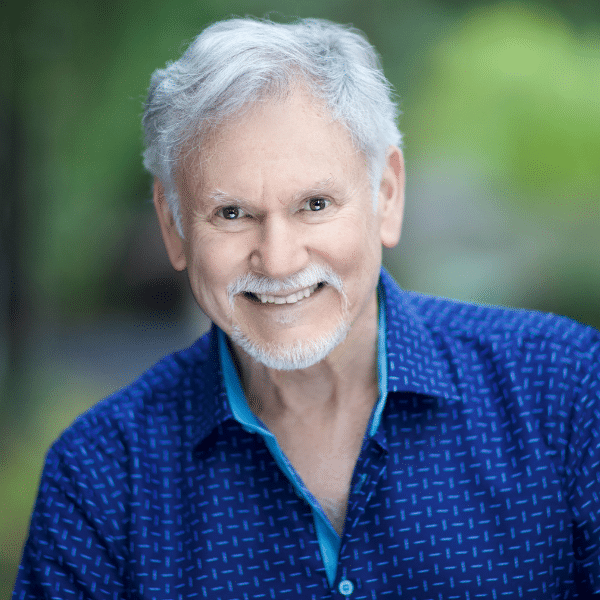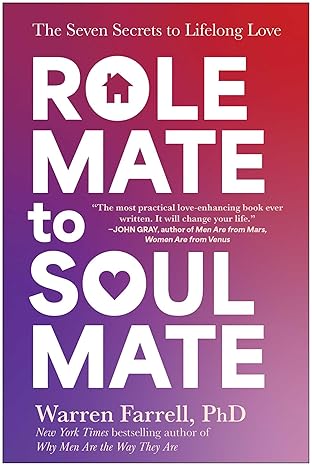How to Build a Marriage That Lasts
(Interview with Dr Warren Farrell)
Listen To the ‘Love & Cherish’ Podcast
The art of staying Close and growing closer
I had the absolute privilege of speaking with Dr Warren Farrell, author of The Boy Crisis and Rolemate to Soulmate.
Warren has been a huge influence in my life and marriage. His work helped my husband and I see fatherhood and partnership in a new light, and I credit his ideas with helping to steady us through difficult years.
In this episode, we talked about what it really takes to stay emotionally married. Not just living together, but staying connected, playful, and intimate through all of life’s seasons.
Why couples drift apart
Warren explains that many relationships break down for a simple biological reason: when we feel criticised, our brains react as if we’re under attack. Defensiveness is a survival reflex, useful for staying alive, terrible for staying in love.
That’s why so many couples fall into the same trap: one person raises an issue, the other defends, both walk away feeling unheard. Repeat this for years and emotional distance becomes the norm.
The Caring & Sharing Practice
To help couples rebuild connection, Warren developed a two-hour weekly ritual he calls the Caring and Sharing session.
It’s simple, structured, and surprisingly powerful:
- Start with appreciation.
Take time to notice specific things your partner does well, not just “thanks for dinner”, but what you loved about the meal, or how they handled something with warmth or humour. Specific praise fills what Warren calls the “reservoir of love.” - Prepare to listen.
Before discussing any difficult topic, each partner reflects on a few grounding “mindsets.” For example:
If I’d risk my life to save you, the least I can do is listen to you.
It sounds dramatic, but it resets perspective and replaces defensiveness with care. - Create a conflict-free zone.
Outside of that weekly session, partners agree not to bring up complaints or criticisms. Knowing there’s a safe time to talk frees the rest of the week for warmth, play, and daily life without constant tension.
This rhythm; appreciation, reflection, structured honesty, changes everything. Couples stop reacting and being hearing each other instead.
Learning to hear, not Preparing to reply
Warren describes something we all do without realising: self-listening. That’s when we’re “listening” to our partner but secretly preparing our comeback or rehearsing what to say next. The fix is simple: notice it, pause, and say the word “hold.” Then return your full attention to your partner.
It’s a small act that communicates safety. When someone finally feels heard, fully and calmly, defensiveness disappears.
From role Mates to soul Mates
Warren distinguishes between being rolemates and soulmates.
- Rolemates share duties and efficiency (who cooks, who earns, who manages the kids.)
- Soulmates share emotional safety (the certainty that no matter what’s said, it will be heard with love.)
Our grandparents mostly focused on survival and roles. We want more: love, respect, sexual connection, emotional depth. Those higher expectations are beautiful, but they require new skills.
Why communication is the foundation
Warren links poor communication to what he calls the boy crisis.
When couples can’t communicate, families fracture. Father involvement drops and children suffer. Especially boys who grow up without models of connection and trust. Fix the communication, he says, and you prevent that cycle before it starts.
Practising love as a discipline
Love isn’t a feeling that sustains itself. It’s a practice, an art and a discipline.
Complimenting, listening, setting aside time to talk, these are small daily choices that build emotional safety. As Warren put it, “Couples that play together, stay together.”
Could Your Relationship Use Some Support?
Book an Online Coaching Session with me

Laura How
Relationship Counsellor & Coach

My Thoughts
I’ve seen the same truth again and again in therapy: couples don’t fall apart because of one argument, but because they lose the faith that problems can be fixed. The Caring and Sharing approach gives that faith back. When you know there’s a way to be truly heard, defensiveness softens and intimacy returns.
A marriage built on that level of trust becomes something sacred. As it should be.

“Your warmth and your openness, and the way you don’t pretend to have it all together… you work with couples and you acknowledge your own evolution, what you’re going through. I think that’s such a relief for couples to realise that the therapist they’re working with is a human being; someone who’s been through this, who’s working through it, and open to new stages of development herself.
That’s so much more life-enhancing for people than hearing from a ‘know-it-all’ who pretends to have the answers. You offer a great deal. Your warmth, openness, and vulnerability are deeply appreciated by me.”
Dr Warren Farrell
Author of The Boy Crisis and Role Mate to Soul Mate
(From the Love & Cherish Podcast, 2025)
Resources mentioned
- Rolemate to Soulmate by Dr Warren Farrell
- The Boy Crisis by Dr Warren Farrell and Dr John Gray
- Warren Farrell’s workshops and online courses: warrenfarrell.com
Order You Copy of ‘Role Mate to Soul Mate’ Here:

Role Mate to Soul Mate
In this book, you’ll learn concrete practices to: Appreciate your loved one with creativity, consistency, and with five levels of specificity Transform the “Four Depleters of Love” (Criticisms, Complaining, Complacency, and Controlling) into four ways to deepen love Master the “Eleven Soulmate Wisdoms” Create and sustain both a “Conflict-free Zone,” plus a “Caring and Sharing Practice” not to resolve conflicts, but to prevent them. Play together (“Couples that play together, stay together.”)
Create concrete, win-win solutions to your stickiest problems Apply your new skills to family, friends, colleagues – and even political opponents Falling in love is natural; sustaining love is unnatural; it requires skills no one learns, and the discipline to implement them. No book blends the art, discipline, and proven concrete practices to overcome the obstacles to a lifelong love better than Role Mate to Soul Mate.



